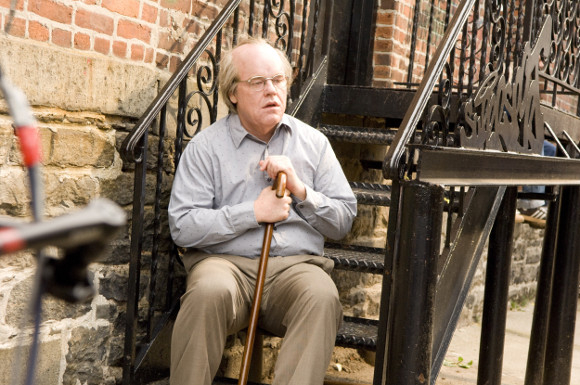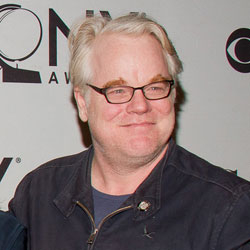Michael Coveney: Philip Seymour Hoffman, a troubled and unforgettable star of stage and screen
The actor, who’s been found dead at the age of 46 from a suspected drug overdose, was a rare genius, says our chief critic

One of Philip Seymour Hoffman's most extraordinary movies was Charlie Kaufman's Synechdoche, New York, in which he played a crazed theatre director building a scale replica of New York City in a giant warehouse for a stupendous play he was preparing. Living with dreams, paranoia and obsession, Seymour Hoffman's director was doomed to failure but also heroically representative of any stage career at its most vulnerable and ambitious.
That movie, along with Paul Thomas Anderson's Magnolia – one of several he made with that director – is one of my all-time favourites. There wasn't one Seymour Hoffman movie, in fact, that I didn't enjoy or admire. And his tangled, tortured studies in self-loathing – most strikingly, perhaps, as the gay, overweight boom operator on a porn movie in Boogie Nights – seemed to come from somewhere very deep and troubled inside.
He was a phenomenally gifted and interesting actor. Probably his most "theatrical" screen performance was that of the Catholic priest in John Patrick Shanley's Doubt, originally a stage play, in which he mediated tactfully between Meryl Streep and Amy Adams, a wounded and vulnerable cleric with more need of the confessional box than his own clients.
In recent years he had cemented his status as Broadway royalty as Iago and, especially, as Willy Loman in Mike Nichols' revival of Death of a Salesman; he had played an acclaimed Konstantin in Nichols' production of The Seagull ten years earlier, with Meryl Streep and Kevin Kline. Around that time he also played the elder son in Long Day's Journey Into Night, alongside Brian Dennehy, Vanessa Redgrave and Robert Sean Leonard.

© Tristan Fuge
It's incredible to think that he's gone, and so tragic that he was just 46 years old, with three young children, too. I met him just the once when, six years ago, Howard Panter's Ambassador Theatre Group hosted a select, across-the-table press conference for him and Cate Blanchett to announce a three-way producing collaboration between the LAByrinth Theater Company he ran in New York with John Ortiz, the Sydney Theatre Company run by Blanchett and her writer husband, Andrew Upton, and ATG themselves. He was totally delightful, charming, serious, modest. (So, of course, was Cate.)
I don't know what happened to this continent-hopping consortium. It soon fizzled out. There was a play of Upton's called Riflemind, which premiered in London in 2008, charting a rock band's reunion 20 years after their last concert; Seymour Hoffman directed it, pretty well, but the play, with John Hannah in the cast, wasn't the hit everyone expected it to be and was chiefly memorable, if at all, for a scene of outrageously explicit full-on sex across the back of a sofa.
Like John Malkovich and Kevin Spacey, Seymour Hoffman had meaningful links with the London theatre all his career. He was a graduate of the New York University drama school and, in the late 1990s, appeared in off-Broadway productions of Caryl Churchill's The Skriker and Mark Ravenhill's Shopping and "Flower-Arranging." One of his LAByrinth productions, Jesus Hopped the A Train by Stephen Adly Guirgis, visited the Edinburgh Festival fringe in 2001 and, in the following year, was presented by Sam Mendes in an American season at the Donmar Warehouse. This was a powerful prison play that pitted two criminals – a psychotic serial killer and a confused young patsy – in a duel of jazzy, demotic dialogue; it was electrifying from start to finish, and Seymour Hoffman's direction palpably top class.
Moneyball, The Ides of March, The Talented Mr Ripley (directed by Anthony Minghella), The Big Lebowski of the Coen Brothers… these and other movies frequently appear on everyone's top ten lists and contain a range of character performances possibly without equal in his generation of actors. How great he must have been on stage, too, in Sam Shepard's True West, when he followed the example of Antony Sher and alternated playing the two brothers, with John C Reilly, in the same production.
He was finical, drawling and very funny as Truman Capote, a role that won him his Oscar in 2005, and placed him head to head with our own Toby Jones as the same rarefied and narcissistic writer in a rival movie. But mostly he created characters who sweated a lot emotionally; as one profile writer said, he looked as though he never ironed his shirts and often stained his trousers. He was the perennially rumpled, overgrown schoolboy, a born outsider, a natural underdog, a sinner with soul, a rare genius. And when he dreamed big, as he did as the director Caden Cotard in Synechdoche, New York, the lava-like overflow was blisteringly hot, devastating, and unforgettable.
See Also: Philip Seymour Hoffman: Tributes flood in from across Theatreland












